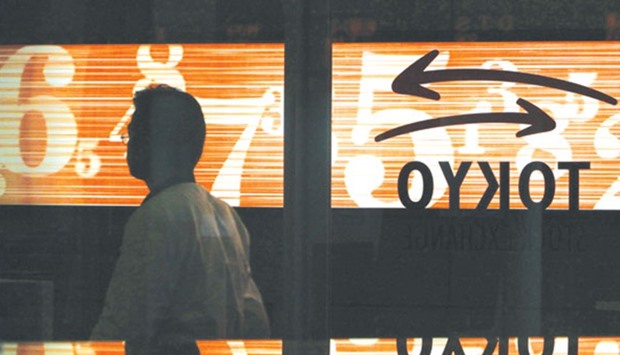Tokyo stocks were flat yesterday after figures showed Japan’s economy stalled in the second quarter, but some other Asian markets climbed along with a rise in the oil price.
Shanghai jumped more than 1% while Sydney and Hong Kong were also up, even after weak economic data out of the eurozone and US on Friday left European and Wall Street stocks under pressure and gave Asia a weak lead.
In Japan, data showed that growth in the world’s third largest economy was flat at 0.0% quarter-on-quarter, missing economists’ predictions for a 0.2% expansion in the April-June period as weak exports and a fall in business spending held back activity.
On an annualised basis, the economy expanded by a slight 0.2%, well off expectations for 0.7% growth.
“Today’s data are quite disappointing,” said Junko Nishioka, chief economist at Sumitomo Mitsui Banking.
“The situation is becoming tougher and tougher.
There is the rally in the yen and worries about Japan’s prospects in overseas markets.
And so companies are becoming more pessimistic about making investments.”
Tokyo edged up just 0.79 points by the break.
However, embattled electronics maker Sharp surged 15% on news the giant has completed a deal to be acquired by Taiwan’s Hon Hai Precision, known as Foxconn.
In the US, trade was muted Friday after economic data showed that US retail sales for July came in at $457.7bn, the same as the previous month, suggesting a key driver of the world’s largest economy had plateaued by mid-summer.
Analysts said this could mean a possible further delay in a rate hike by the US central bank.
Official data out of Europe meanwhile revealed that the EU’s biggest economy Germany expanded by 0.4% in adjusted terms between April and June but overall eurozone second quarter growth slowed sharply, weighed down by Brexit concerns and a poor performance in struggling France and Italy.
Growth in the 19-nation eurozone came in at 0.3%, slowing from 0.6% in the three months to January but unchanged from the initial estimate given last month.
Government figures released in China on Friday also disappointed, with growth in retail sales, factory output and fixed asset investment also missing expectations.
But some Asian markets appeared to shrug off the weak data.
Hong Kong and Shanghai rose 0.5% and 1.4% respectively, while Sydney added 0.2%.
Financial markets in Seoul were closed for a public holiday.
Energy stocks were among the top performers as the oil price continued to rise on hopes of producer action to control output.
At around 0300 GMT, West Texas Intermediate rose 44 cents to $44.93 while Brent added 41 cents to $47.38.
“Oil is now close to an equilibrium price, and unless we get further developments, I would expect to see it trading around the $44 to $45 level for the balance of the week,” Michael McCarthy, a chief market strategist in Sydney at CMC Markets told Bloomberg News.
Oil futures suffered a bearish July, with prices sinking on worries of bloated inventories, oversupply and less-than-solid demand.
But prices got a boost after Saudi Arabian oil minister Khalid al-Falih was quoted on Thursday as saying producers could use next month’s Opec meeting to discuss “any possible action” on stabilising markets, despite the record Saudi production levels last month.
In Tokyo, the Nikkei 225 flat at 16,920.71 points; Shanghai — Composite up 1.4% at 3,094.668 points and Hong Kong — Hang Seng up 0.5% at 22,869.24 points at the close yesterday.

asian


